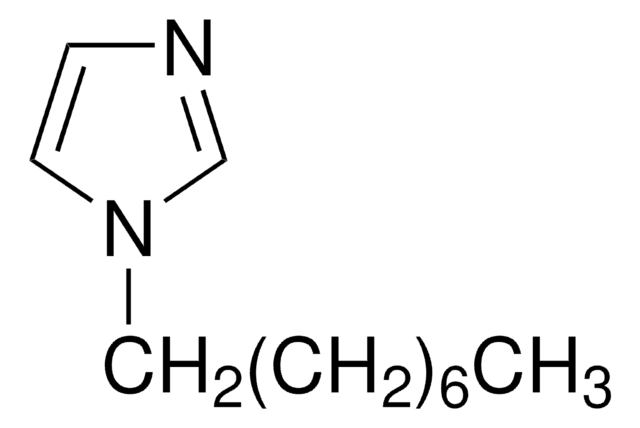348414
1-Butylimidazole
98%
Synonyme(s) :
1-Butyl-1H-imidazole, 1-n-Butylimidazole, N-(n-Butyl)imidazole, N-Butyl-1H-imidazole, N-Butylimidazole, N-Butylimidazolium
About This Item
Produits recommandés
Niveau de qualité
Pureté
98%
Forme
liquid
Indice de réfraction
n20/D 1.480 (lit.)
Point d'ébullition
114-116 °C/12 mmHg (lit.)
Densité
0.945 g/mL at 25 °C (lit.)
Chaîne SMILES
CCCCn1ccnc1
InChI
1S/C7H12N2/c1-2-3-5-9-6-4-8-7-9/h4,6-7H,2-3,5H2,1H3
Clé InChI
MCMFEZDRQOJKMN-UHFFFAOYSA-N
Vous recherchez des produits similaires ? Visite Guide de comparaison des produits
Description générale
Application
Mention d'avertissement
Danger
Mentions de danger
Classification des risques
Acute Tox. 2 Inhalation - Eye Dam. 1 - Skin Corr. 1B
Code de la classe de stockage
6.1A - Combustible acute toxic Cat. 1 and 2 / very toxic hazardous materials
Classe de danger pour l'eau (WGK)
WGK 3
Point d'éclair (°F)
293.0 °F
Point d'éclair (°C)
145 °C
Équipement de protection individuelle
Eyeshields, Gloves, type ABEK (EN14387) respirator filter
Faites votre choix parmi les versions les plus récentes :
Déjà en possession de ce produit ?
Retrouvez la documentation relative aux produits que vous avez récemment achetés dans la Bibliothèque de documents.
Les clients ont également consulté
Notre équipe de scientifiques dispose d'une expérience dans tous les secteurs de la recherche, notamment en sciences de la vie, science des matériaux, synthèse chimique, chromatographie, analyse et dans de nombreux autres domaines..
Contacter notre Service technique












